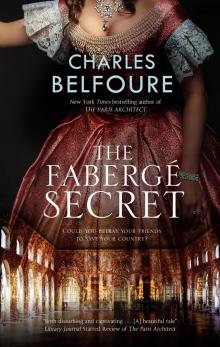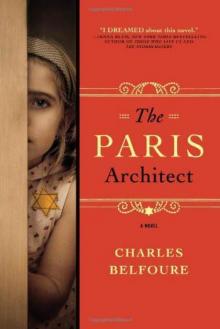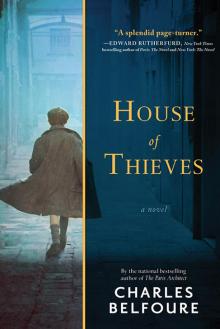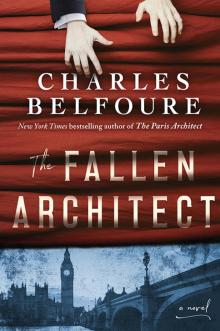- Home
- Charles Belfoure
The Fallen Architect
The Fallen Architect Read online
Also by Charles Belfoure
The Paris Architect
House of Thieves
Thank you for purchasing this eBook.
At Sourcebooks we believe one thing:
BOOKS CHANGE LIVES.
We would love to invite you to receive exclusive rewards. Sign up now for VIP savings, bonus content, early access to new ideas we're developing, and sneak peeks at the latest from Charles Belfoure!
Happy reading!
SIGN UP NOW!
Copyright © 2018 by Charles Belfoure
Cover and internal design © 2018 by Sourcebooks, Inc.
Cover design by Adrienne Krogh/Sourcebooks, Inc.
Cover image © Rekha Garton/Arcangel Images, Songquan Deng/Shutterstock, iulias/Shutterstock, Viorel Sima/Shutterstock
Endsheet image © By permission of Historic England Archive, view across the auditorium, Opera House/Stoll Theatre, London 1911
Sourcebooks and the colophon are registered trademarks of Sourcebooks, Inc.
All rights reserved. No part of this book may be reproduced in any form or by any electronic or mechanical means including information storage and retrieval systems—except in the case of brief quotations embodied in critical articles or reviews—without permission in writing from its publisher, Sourcebooks, Inc.
The characters and events portrayed in this book are fictitious or are used fictitiously. Apart from well-known historical figures, any similarity to real persons, living or dead, is purely coincidental and not intended by the author.
Published by Sourcebooks Landmark, an imprint of Sourcebooks, Inc.
P.O. Box 4410, Naperville, Illinois 60563-4410
(630) 961-3900
Fax: (630) 961-2168
sourcebooks.com
Library of Congress Cataloging-in-Publication Data
Names: Belfoure, Charles.
Title: The fallen architect / Charles Belfoure.
Description: Naperville, Illinois : Sourcebooks Landmark, [2018]
Identifiers: LCCN 2018003445 | (hardcover : acid-free paper)
Subjects: LCSH: Life change events—Fiction. | Architects—Fiction. | GSAFD: Suspense fiction. | Mystery fiction.
Classification: LCC PS3602.E446 F35 2018 | DDC 813/.6—dc23 LC record available at https://lccn.loc.gov/2018003445
Contents
Front Cover
Title Page
Copyright
Prologue
1
2
3
4
5
6
7
8
9
10
11
12
13
14
15
16
17
18
19
20
21
22
23
24
25
26
27
28
29
30
31
32
33
34
35
36
37
38
39
40
41
42
43
44
45
46
47
48
49
50
51
52
An Excerpt from The Paris Architect
An Excerpt from House of Thieves
Reading Group Guide
A Conversation with the Author
Acknowledgments
About the Author
Back Cover
The Britannia Fatalities
Denys Blair, 78
Ronald Cass, 52
James Croyden, 37
Robert Davidson, 12
Shirley Finney, 19
Daphne Foster, 46
Ted Hardy, 44
John Mapes, 41
Isabel Massey, 14
Hugh Rice, 53
Sir John Richardson, 54
Jocelyn Shipway, 31
Trevor Stanton, 42
Sibyl Treadwell, 36
Prologue
England, 1905
“I didn’t kill all those people… It wasn’t me.”
Tears welling up in his eyes, Layton pointed the electric torch at the thin, gold wedding band in the palm of his hand.
He smiled and placed the ring in his pocket, then shone the light again on the skeleton from whose finger he had taken the ring.
“I don’t know why you did this to me, Peter. But thank you for giving me back my life.”
1
“I was outside a lunatic asylum one day, busy picking up stones
When along came a lunatic and said to me, ‘Good morning, Mr. Jones;
Oh, how much a week do you get for doing that?’
‘Thirty bob,’ I cried.”
“There ain’t no finer music hall star than Jimmy Doyle, lads, not in the whole bleedin’ world,” Jim Sheffield yelled.
His two boys didn’t hear their father. They were too caught up in Jimmy’s performance, playing out on the brightly lit stage below. Like every member of the audience, the boys were stomping and singing along to his famous rendition of “Come Inside, You Silly Bugger.”
It delighted Jim to see Clive and Edward enjoying themselves so much. Wasn’t that what being a father was all about, bringing joy to your children? And they wouldn’t be boys for long. Soon, they’d have to deal with all the harsh shite that came with being grown-up. So what was the harm in it, taking them to a brand-new London music hall on its opening night? It was something they’d never ever forget.
To hell with his wife, complaining about the one-quid admission for the dress circle. The fancy first-balcony level was worth every penny. Jim remembered his granny, who could scarcely afford it, taking him weekly to the Norwich Hippodrome. Two hours with amazing people who could make you laugh till you cried—she’d always believed that was worth missing a meal or a pint.
And what a place! The new Britannia Empire was beautiful, Jim thought, looking up at the huge domed ceiling. Real electric lights twinkled above him like stars in the night sky. The elegant white plasterwork on the face of the horseshoe-tier balconies that wrapped around the theatre reminded him of crème frosting on a wedding cake. Plush, red velvet, soft as a kitten, covered the seats. When the audience had filed in, they’d been so taken with the beauty of the interior that they’d actually cheered and applauded the theatre itself. The Britannia was bloody magical.
“He looked at me and shook his head,
And this is what he cried,
‘What, thirty bob a week, with a wife and kids to keep?
Come inside, you silly bugger, come inside.’”
Jimmy, who wore baggy checked trousers, a red derby, and a long, blue satin frock coat, started kicking out his gangly legs, dancing back and forth across the stage. The orchestra picked up on the excitement and played louder and faster, delighting the crowd, which sang louder and stamped their feet harder and faster. Jimmy, the music hall legend, had that special skill to make the audience feel like they were part of what was going on onstage. He had the house in the palm of his hand, and he loved it.
Jim playfully slapped Clive’s back, and the boy beamed at his father.
“�
�Come inside, you silly bugger, come inside.
You ought to have a bit more sense.
Working for a living? Take my tip;
Act a little screwy and become a lunatic.
Oh, you get your meals regular, and a brand-new suit besides.
Thirty bob a week, no wife and kids to keep.
Come inside, you silly bugger, come inside.’”
The orchestra played even louder, the brass section pounding away furiously. To keep the momentum going, they launched into another chorus.
That’s when Jim felt a slight vibration in the bottoms of his shoes. It traveled through the heavy leather soles into his feet like an electrical current. He looked about and saw other patrons staring down in bewilderment. Clive and Edward were doing the same, with puzzled looks on their faces. And all the while, the orchestra and Doyle played on.
An ear-splitting crack sounded, as though someone had crashed cymbals next to Jim’s ears. The house lights flickered, and the high-pitched screech of bending steel filled the air, adding to the terrible cacophony. Just as Jim’s panic-stricken eyes met his sons’, the floor collapsed beneath him. He dropped like a rock, Clive and Edward plummeting alongside, their arms flailing above their shoulders.
Now, instead of a happy, raucous song, nonstop screaming filled the theatre.
• • •
A half hour later, Douglas Layton stood across Shaftesbury Avenue. Feeling as though he were trapped in an unending nightmare, he watched the police carry body after body out of the Britannia Empire Theatre—the music hall he had designed.
2
One brown tweed suit with waistcoat, white shirt, collar, tie, one pair of brown Dunham shoes with black socks—all of which you’re wearing now. One gold watch and fob, one house key, one man’s comb, one silk handkerchief, one photo in a silver frame, one gold cigarette case, fifty-eight pounds in notes, and five bob in coins. Sign here that these items have been returned to your person.”
Douglas Layton stared at the pen the prison officer had just dipped in the inkwell. Slowly, he reached across the battered wooden counter, took it in hand, and scratched his name across the form.
“That’ll do ya, mate. Proceed out that door to the right. The alley’ll lead you to the public thoroughfare—and mind you don’t leave England.”
Layton turned and shuffled toward the plate iron door. A blast of cold drizzle hit him in the face. Pausing, he gathered his jacket collar up around his neck. Staring down at the gray granite paving blocks, he began walking.
After twenty yards, the alley intersected a deserted road. He stopped and looked to his right, then his left. In both directions, brown gravel stretched through wet, green countryside to the horizon. It didn’t matter which turn he took, he thought. Either way led to a frightening and terrible future.
Before he made up his mind, Douglas Layton turned to face the place that had been his home for the last five years. Mulcaster Prison. He had never looked closely at its exterior. The day he had arrived in the fall of 1900, his head had hung low in shame. Now he saw—with an architect’s eye—that the place was well designed, all imposing stone walls topped with crenellations and punctuated with towers. A Crusader castle adapted for penal servitude. It gave the public reassurance that the felons inside could never get out and kill them in their sleep. Its design did its job beautifully, making the inmates feel less than human, as if they deserved to be there.
Prisons, Layton thought grimly, were designed by people who had never been in one. He must drop a line to the architect, Sir Laurence Chance, a former colleague in the Royal Institute of British Architects, to tell him how magnificent his design was. He could imagine Chance’s expression: he’d drop the note in disgust, as if a dead rat had been placed in his hand.
Layton had known when he’d opened the door of the prison that there would be no one waiting for him. His wife, Edwina, had filed for divorce and left with their four-year-old son, Ronald, just six months after he entered Mulcaster. He knew everyone else would shun him too, even his closest friends and colleagues. Neither they nor his wife had ever come to visit him. But he couldn’t blame them; British society had ironclad rules, and one was this: don’t associate with an outcast. Layton had become a social leper. To avoid him infecting all he knew, years of friendship and family were thrown to the winds, as if he’d never existed.
Without thinking about it, Layton jammed his hands in his pockets and turned left. England’s high-security prisons were always built in the countryside. Mulcaster stood in the middle of Lincolnshire in the East Midlands, which meant a long hike to a village or any other semblance of civilization. It was just ten in the morning; there was plenty of daylight left. With no future ahead, Layton saw no reason to hurry. He slowed his pace—and felt a hard blow on the top of his head.
Another missile flew past his ear. He ducked instinctively, touched his hair to see if there was blood.
“I’ve been waitin’ for this day, you murderin’ bastard. I swore to Christ I’d be here!”
Layton whirled and saw the woman, standing just five yards away. She was in her forties, had hair tied in a bun and a dark frock under a black coat. His first thought was that she was drunk or mad, but as he took in her stern expression, Layton realized he was mistaken. He watched, bewildered, as she picked up another rock and cocked her arm to throw.
“You bloody bastard!” she cried. “You killed me daughter. Twelve was all she was. Me only child. Crushed to death by you, you goddamn monster!”
The woman hurled the stone, which sailed over Layton’s head.
“I was supposed to go that night!” she screamed. “Did you know that? But I got the woman cramps, so I gave the ticket to me sister to take Isabelle. She’d bin lookin’ forward to it for so long. I dinna want to disappoint her. And now she’s dead.”
The woman fell to her knees in the road and doubled over, shrieking as though she’d been stabbed in the stomach.
“I ain’t got nobody now… Nobody!”
Layton cringed and ran like a beaten dog with his tail between his legs, the woman’s screams ringing in his ears.
“Murderer! They shoulda hanged ya. You don’t deserve to live, you miserable bag of shite!”
3
In prison, Layton had been surprised to discover that no one asked about the crimes an inmate had committed. It was a man’s own business. If he wanted to talk about it, that was fine, but a person was never asked. This came as a great relief to him, as he’d been convicted of killing fourteen people and injuring scores more.
He was scared to death in his first days, sure he’d be beaten or killed. But nothing happened. Murderers, rapists, thieves, extortionists, pedophiles—in Mulcaster, no one seemed to care. It wasn’t as if his fellow inmates didn’t know who he was. His name and photograph had run in newspapers around the globe for months, beneath lurid headlines about the Britannia Empire Theatre disaster. It was all people talked about. But to the other prisoners, it wasn’t a “regular” murder. Not like knifing a fellow in a pub fight or shooting your wife and her lover in bed. This had just been an accident. Most of the men with whom he’d served his time didn’t understand why he’d been convicted.
But Layton did. Day after day in courtroom five of the Old Bailey, the prosecution had accused him of being an incompetent architect, of incorrectly designing the steel trusses that had supported the Britannia’s balconies. Through his carelessness, those fourteen people, including two children, had been crushed to death. Among the many injured, twelve had lost arms or legs. One man’s skull was so fractured that he never recovered; the accident left him with the mind of a five-year-old. The severity of their injuries meant many could no longer earn a living.
Sir John Chichester, the chief prosecutor, described every injury in gruesome detail, showing photos of bodies so mangled that some jury members were sickened; one actually fled the cou
rtroom to throw up. Witness after witness described that terrible night, the joy of experiencing opening night at the theatre turned in a millisecond to tragedy. Some wore stoic expressions. Some cried when they described the feeling of falling, of smashing into the floor and screaming desperately for help.
A man named Sheffield broke down when he described his son, Clive, a talented footballer who’d lost his leg. Jimmy Doyle, the music hall star, took the box and, with tears in his eyes, described the carnage he’d seen from the stage.
Layton’s barrister withered under the assault. By the second day, he’d all but given up. On the witness stand, Layton tried to tell the court that the cantilevered balcony trusses had been designed correctly, with a safety factor two and a half times stronger than what was needed. As an architect, he explained passionately, safety was an essential feature of his designs. The Victoria Hall disaster in 1883, where 183 panicked children were trampled to death while trying to get down to the stage for free toys given out after the performance, had shocked the British public. In its wake, the London County Council enacted strict new building codes. Layton made the Britannia’s hallways and stairs wider than required, allowing the audience at every level to exit in a speedy, orderly manner at the first sign of danger. He used a newly invented “panic door,” which couldn’t be locked from the inside. Mindful of the horrible fire at the Exeter Theatre Royal—186 people dead in 1887—he used newly available asbestos fabric to fireproof the great theatre curtain.
No one believed him. He couldn’t prove that Shaw Construction Ltd., the general contractor, had erected the steelwork incorrectly; upon examination, the surviving trusses passed muster, and the steel fabricator swore that everything had been manufactured to exact specifications. Layton was vilified in the press, called the greatest murderer in British history. The Butcher of the West End. The newspapers made it seem as if the entire horseshoe-shaped first balcony had collapsed when, in reality, only a front section fifteen feet in width had failed.
The architect passed the ten-day trial in a dazed, dreamlike state. By the end, he believed himself guilty. Somehow, he was responsible for the death and destruction that night. He, and no one else. One of England’s best architects had become a mass murderer.

 The Fabergé Secret
The Fabergé Secret The Paris Architect: A Novel
The Paris Architect: A Novel House of Thieves
House of Thieves The Fallen Architect
The Fallen Architect